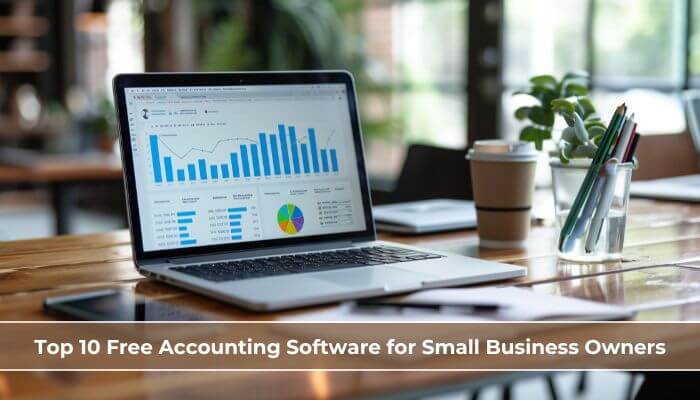Financial control is essential for small businesses to remain profitable and in control in this modern business environment. But expensive accounting solutions are not always within the means of start-ups or small business owners on a tight budget. Fortunately, plenty of free accounting software offer all the tools needed for a small business to track expenses, generate invoices, and even manage payroll without breaking the bank.
Here are the top 10 best free accounting software for small businesses, where financial management becomes less complex and you can spend your time growing your business.
Benefits of Using Free Accounting Software for Small Businesses
Before diving into the top software choices, it’s worth understanding why free accounting software can be a valuable asset:
- Cost Savings: Paid accounting tools can be a significant expense, but free options offer essential features at no cost, freeing up funds for other important business areas.
- Time Efficiency: By automating tasks like invoicing and expense tracking, accounting software helps small business owners save time.
- Improved Accuracy: Manual data entry can lead to errors. These tools offer automated calculations, reducing the chances of mistakes.
- Financial Insights: Most accounting software includes dashboards and reports that provide insights into cash flow, profits, and losses.
- Cloud Accessibility: Many free accounting tools are cloud-based, allowing business owners to access their finances anytime, anywhere.
Also Read: 7 Common Payroll Mistakes and How to Avoid Them
Top 10 Free Accounting Software for Small Business Owners
Here are some of the best free accounting software options that offer robust features without a high price tag.
1. Wave
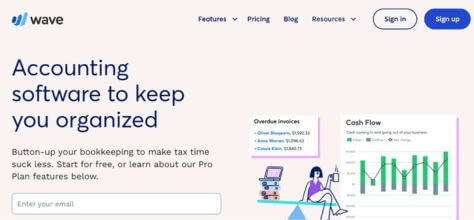
Wave is the top pick for startups and freelancers that need free, easy-to-use accounting software. You can get the basics such as invoicing, cash flow monitoring, and scanning receipts on the platform for free. Wave also integrates seamlessly with other platforms, so even small businesses can connect their bank accounts and credit cards without much trouble. It works in different currencies, which is an advantage for global businesses.
Price Range: While Wave’s core features are free, optional add-ons like payroll services are available for around $20 per month.
Key Features: Wave stands out as an excellent option for small businesses and freelancers who need basic accounting features without the need for advanced tools.
2. ZipBooks
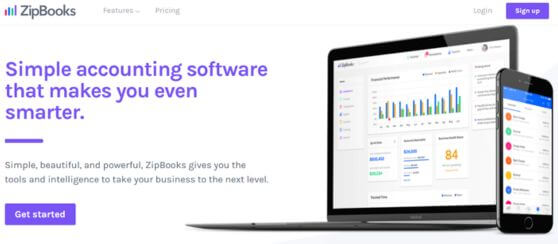
ZipBooks has a free Starter plan which is perfect for small businesses that just want basic accounting tools. This plan includes important features such as invoice management, expense tracking, and access to basic reports. ZipBooks provides a smarter package at $15 per month for businesses that want to have more sophisticated reporting and collaboration features. It is a good option for businesses that might want to upgrade as they expand.
Price Range: Free for basic features; Smarter plan starts at $15 per month.
Key Features: ZipBooks stands out with its automatic tagging feature, which categorizes transactions, saving time for users.
3. Zoho Books (Free Plan)
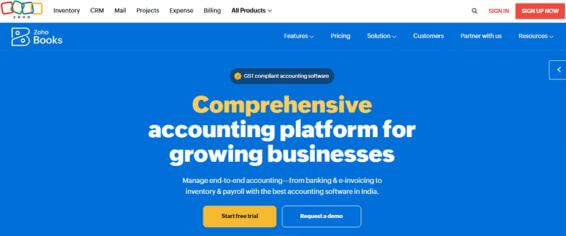
Zoho Books offers a free plan for businesses with annual sales under $50,000 which is perfect for small businesses. Client management, project management, and expense management are the key functions of this tool for small business users. Zoho Books is a Zoho suite, so it integrates seamlessly with other Zoho products including Zoho CRM and Zoho Inventory.
Price Range: Free for businesses with annual revenue under $50,000; paid plans starting at $20 per month.
Key Features: Zoho Books is especially useful for businesses already using Zoho products, as it integrates easily with the entire suite of tools.
4. Akaunting
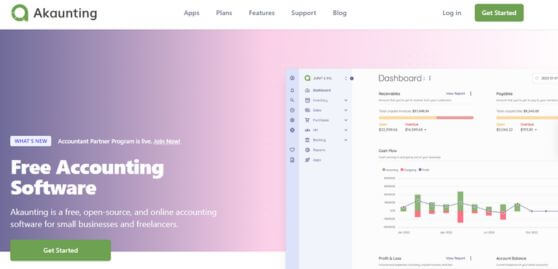
Akaunting is an open-source and free software for anyone who desires to take full ownership of their accounting data. Its features include invoicing, expense tracking, and extensive reporting that is useful for tech-savvy users. It’s perfect for businesses looking to build a custom, self-hosted accounting system.
Price Range: Free for core features; additional modules cost between $10 to $50.
Key Features: The open-source nature of Akaunting allows businesses to customize the platform according to their needs, making it ideal for growing businesses that need flexibility.
5. GnuCash
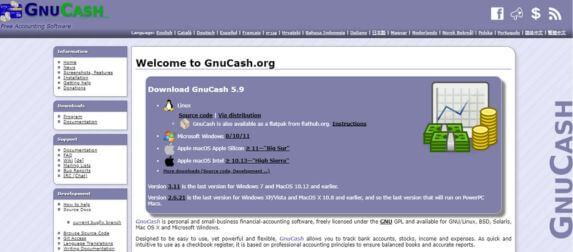
GnuCash is a completely free, desktop-based accounting tool with double-entry bookkeeping capabilities for advanced users. It offers transaction tracking and accounting capabilities, which is very reliable for businesses with complex financial needs.
Price Range: Free with no hidden fees or subscription requirements.
Key Features: GnuCash’s advanced features, like portfolio management and investment tracking, make it unique for businesses with more intricate accounting needs.
6. Sunrise by Lendio
Sunrise offers a free plan that is great for freelancers and small businesses, and it includes everything from revenue tracking to invoicing and simple financial reporting. The software is perfect for business owners looking for entry-level accounting software that can be upgraded to paid services if necessary.
Price Range: Free for basic features; paid plans start at $149 per month.
Key Features: Sunrise is unique in offering free accounting support and personalized insights from experienced accountants, which can be invaluable for new business owners.
7. Manager

Manager’s single-user desktop version is completely free and provides basic accounting functionality such as invoices, payroll, and reports. To get into the cloud, with multi-user support, the Manager’s cloud plan starts at $39 per month. This is software that can be easily migrated from desktop to cloud for companies who need offline but may later scale up.
Price Range: Free for the desktop version; cloud version starts at $39 per month.
Key Features: Manager supports multiple languages and currencies, making it an ideal choice for businesses with international reach.
8. Brightbook
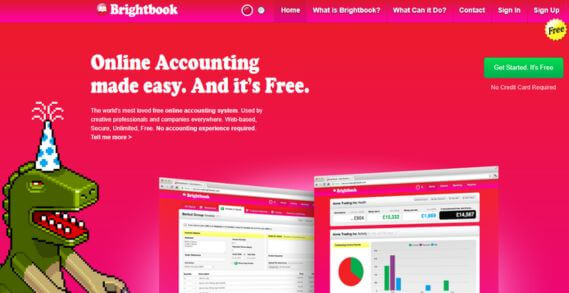
Brightbook is an online accounting tool for freelancers and designers with free invoicing and expense management. Because Brightbook is completely free and has no subscription, it’s also very accessible and ideal for the budget-conscious freelancer or startup.
Price Range: Completely free with no paid plans.
Key Features: Brightbook’s simplicity and focus on essential features make it a perfect choice for freelancers and small business owners who prefer an easy-to-use platform without unnecessary complexity.
9. SlickPie
SlickPie is a cloud accounting tool with a free plan available for small businesses that provide things such as automated receipt data entry and invoicing. It is a great application for entrepreneurs who like to automate and need a streamlined approach to financial management.
Price Range: Free for basic features; customized premium plans available.
Key Features: SlickPie’s auto-data entry system for receipts is a unique feature that significantly reduces manual input, saving time for business owners.
Also Read: How To Choose The Best Credit Card Machines For Small Business
10. NCH Express Accounts
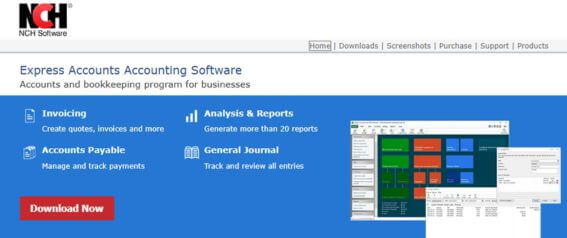
NCH Express Accounts is free for small businesses with a desktop version, which provides features such as invoicing, payment tracking, and cash flow management. It is great for businesses that work offline and need basic accounting tools without spending money on expensive software to do their accounting.
Price Range: Free for the desktop version; paid plans starting at $99 for a one-time license.
Key Features: The one-time license fee for NCH Express Accounts makes it more cost-effective in the long run for businesses that prefer an offline setup.
How to Choose the Best Free Accounting Software for Your Small Business
When you are looking for the best free accounting software for your small business, begin by assessing what you want. Do you need invoicing, expense management, or detailed financial analysis? Consider your size of business and whether you require advanced features such as inventory management or multi-currency integration. Free software often comes with restrictions, so focus on what is important for your business operations.
Easy-to-use is another important aspect of accounting software. Because accounting can be complex, you will need something easy to understand and install, or best of all, cloud-based. Make sure the software you choose has a simple user interface and a straightforward setup to cut out training time.
You should also consider scalability. Can the software scale as your business expands? Free programs are sometimes limited by features once you scale your business, so make sure you are using a program that will let you upgrade to a paid plan with advanced features without paying a large premium.
Lastly, check customer reviews to understand the user experience. Seek customer reviews on the software’s ease of use, the quality of customer support, and reliability of the software. Though reviews are always subjective, they can give you a feel for the software’s strengths and potential weaknesses from those who have deployed it in the business environment.
Conclusion
Small business owners can cut the complexity and the time spent on balancing finances dramatically with the correct accounting software. The strengths of each of the choices above vary from Wave’s comprehensiveness to Accounting’s customizable features. By mapping out your business’s requirements — whether it is for invoices, expenses, or high-level reporting — you will find the right free accounting software to keep your finances in check and let you focus on the most important thing: building your business.
Check out some of these favorites and see which one works best for your workflow. A good finance management will be the basis for long term growth and security in any small business.

